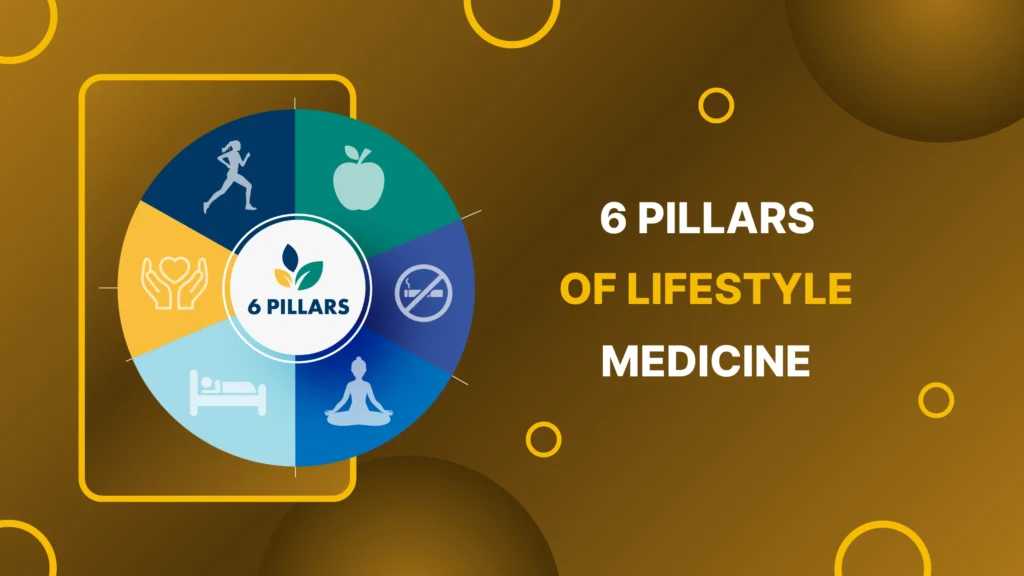Lifestyle medicine is an evidence-based practice aimed at preventing, treating, and reversing chronic diseases through lifestyle changes. At the heart of this approach are six foundational pillars that, when integrated into daily life, can lead to significant improvements in overall health and well-being. Let’s delve into each of these pillars and explore how they contribute to a healthier, more fulfilling life.
1. Nutrition
Nutrition is the cornerstone of lifestyle medicine. A balanced diet rich in fruits, vegetables, whole grains, lean proteins, and healthy fats is essential for maintaining optimal health.
Key Principles of Healthy Nutrition:
- Whole Foods: Emphasize whole, unprocessed foods that provide essential nutrients.
- Plant-Based Diet: Incorporate a variety of plant-based foods to ensure a high intake of vitamins, minerals, and antioxidants.
- Healthy Fats: Choose sources of healthy fats such as avocados, nuts, seeds, and olive oil while limiting trans fats and saturated fats.
- Adequate Hydration: Drink plenty of water to stay hydrated and support bodily functions.
- Portion Control: Practice mindful eating and be conscious of portion sizes to avoid overeating.
2. Physical Activity
Regular physical activity is crucial for maintaining physical and mental health. It helps in weight management, reduces the risk of chronic diseases, and improves mood and energy levels.
Recommendations for Physical Activity:
- Aerobic Exercise: Engage in at least 150 minutes of moderate-intensity or 75 minutes of high-intensity aerobic exercise per week.
- Strength Training: Incorporate strength training exercises at least two days a week to build and maintain muscle mass.
- Flexibility and Balance: Include activities like yoga or stretching exercises to enhance flexibility and balance.
- Daily Movement: Integrate physical activity into daily routines, such as taking the stairs, walking or biking to work, and participating in recreational sports.
3. Stress Management
Chronic stress can lead to numerous health issues, including heart disease, depression, and a weakened immune system. Effective stress management techniques are essential for maintaining mental and physical health.
Effective Stress Management Techniques:
- Mindfulness and Meditation: Practice mindfulness or meditation to calm the mind and reduce stress.
- Deep Breathing Exercises: Engage in deep breathing exercises to promote relaxation and lower stress levels.
- Physical Activity: Exercise regularly to reduce stress and improve mood.
- Hobbies and Leisure Activities: Pursue hobbies and leisure activities that bring joy and relaxation.
- Time Management: Develop effective time management skills to reduce stress related to work and personal responsibilities.
4. Sleep
Quality sleep is vital for overall health and well-being. It is during sleep that the body repairs and regenerates tissues, strengthens the immune system, and consolidates memories.
Tips for Improving Sleep Quality:
- Consistent Sleep Schedule: Maintain a regular sleep schedule by going to bed and waking up at the same time every day.
- Sleep Environment: Create a conducive sleep environment by keeping the bedroom cool, dark, and quiet.
- Limit Stimulants: Avoid caffeine, nicotine, and heavy meals close to bedtime.
- Relaxation Techniques: Practice relaxation techniques such as reading, listening to calming music, or taking a warm bath before bed.
- Limit Screen Time: Reduce exposure to screens (phones, tablets, computers) at least an hour before bedtime.
5. Relationships
Healthy relationships are fundamental to emotional well-being and can positively impact physical health. Social connections provide support, reduce stress, and promote a sense of belonging.
Building and Maintaining Healthy Relationships:
- Communication: Practice open and honest communication with family, friends, and colleagues.
- Quality Time: Spend quality time with loved ones to strengthen bonds and create meaningful connections.
- Support Systems: Cultivate a supportive network of friends and family who can provide emotional and practical support.
- Conflict Resolution: Develop healthy conflict resolution skills to manage and resolve disagreements effectively.
- Community Involvement: Engage in community activities and volunteer work to build a sense of purpose and connection.
6. Avoidance of Risky Substances
Avoiding risky substances, such as tobacco, excessive alcohol, and recreational drugs, is critical for maintaining health and preventing chronic diseases.
Strategies for Avoiding Risky Substances:
- Tobacco Cessation: Seek support to quit smoking through counseling, support groups, and nicotine replacement therapies.
- Alcohol Moderation: Limit alcohol consumption to moderate levels, defined as up to one drink per day for women and up to two drinks per day for men.
- Drug Avoidance: Avoid the use of recreational drugs and seek help if struggling with substance abuse.
- Healthy Coping Mechanisms: Develop healthy coping mechanisms for dealing with stress and emotions without resorting to risky substances.
- Education and Awareness: Stay informed about the risks associated with substance use and seek resources for prevention and treatment.
Integrating the Six Pillars into Daily Life
Adopting the six pillars of lifestyle medicine requires commitment and consistency. Here are some practical tips to help integrate these principles into daily life:
Practical Tips for Integration:
- Set Realistic Goals: Start with small, achievable goals for each pillar and gradually build on them.
- Create a Plan: Develop a personalized plan that includes specific actions and timelines for implementing lifestyle changes.
- Track Progress: Keep a journal or use a mobile app to track progress and stay motivated.
- Seek Support: Enlist the support of friends, family, or a healthcare professional to stay accountable and receive encouragement.
- Stay Informed: Continuously educate yourself about healthy lifestyle practices through reputable sources.
Conclusion
The six pillars of lifestyle medicine offer a comprehensive approach to achieving optimal health and preventing chronic diseases. By focusing on nutrition, physical activity, stress management, sleep, relationships, and the avoidance of risky substances, individuals can take proactive steps towards a healthier, more fulfilling life. Embracing these pillars not only enhances physical health but also promotes emotional and mental well-being, ultimately leading to a higher quality of life. Start incorporating these pillars into your daily routine today and experience the transformative power of lifestyle medicine.





